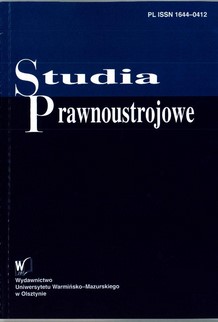Podstawy prawne działań represyjnych wobec przedstawicieli aparatu państwowego II Rzeczpospolitej w Polsce po II Wojnie Światowej
Legal grounds for repressive measures against representatives of the state apparatus of the Second Polish Republic after World War II
Author(s): Tomasz Tadeusz MajerSubject(s): History of Law, Criminal Law, Civil Law, Political history, Politics and law, WW II and following years (1940 - 1949), History of Communism, Administrative Law
Published by: Wydawnictwo Uniwersytetu Warmińsko-Mazurskiego w Olsztynie
Keywords: repression; criminal law; officials; authorities; law;
Summary/Abstract: After the end of World War II and the takeover of power in Poland by the communists, repression began against people associated with the state administration of the Second Polish Republic. The authorities issued a number of legal acts allowing the use of repression against political opponents. Government officials of the Second Polish Republic and the wider elite of that country were also considered political opponents. Mere political activity or work in government administration could have caused repression. The communists recognized the interwar Polish authorities as hostile. Participation in exercising and exercising power after 1926 was often a sufficient excuse for repression. The repression used by the communist authorities took the form of both abuses of power and law-based activities. The latter will be discussed in this article. The Polish authorities issued a number of legal acts enabling discriminatory or repressive measures against specific persons or social groups. Some citizens were to be punished for their political and professional activity before the war. The repressions were related to both criminal- law and civil and administrative law. In addition to imprisonment and other penalties, opponents of the state faced nationalization as well as a campaign of administrative difficulty and harassment. These provisions require careful discussion. Their validity and application may currently form the basis for questioning the legality of a number of state actions. It should also be generally determined when service in the interwar administration or political activity ceased to constitute the basis for repression.
Journal: Studia Prawnoustrojowe
- Issue Year: 2019
- Issue No: 44
- Page Range: 259-275
- Page Count: 17
- Language: Polish

